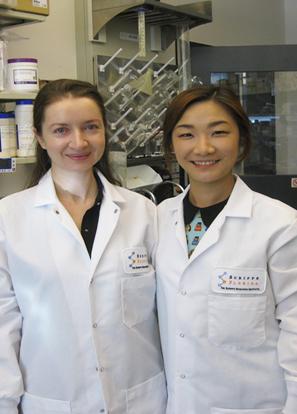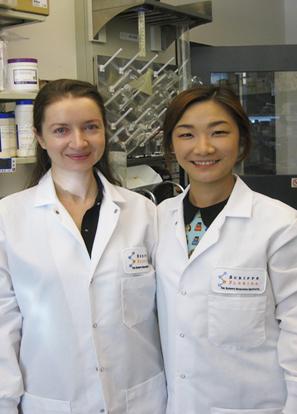
Credit: The Scripps Research Institute
JUPITER, FL – October 13, 2017 – A new study from scientists on the Florida campus of The Scripps Research Institute (TSRI) offers important insights into possible links between sleep and hunger–and the benefits of studying the two in tandem. A related paper from the same lab is providing researchers an accessible tool for pursuing further investigations involving multiple fruit fly behaviors.
While many humans enjoy a daily caffeine fix, scientists have found that caffeine repels Drosophila melanogaster–a species of fruit fly often used as a model for studying human conditions and genetics. Scientists believe that plants produce the caffeine molecule as a defense mechanism to prevent organisms such as fruit flies from eating them. Regardless of the cause of the fly's aversion, caffeine does seem to negatively impact their sleep, much like it does in humans.
Caffeine is known to stave off sleep in humans through pharmacological effects on the adenosine receptor. Nonetheless, many studies in mammals have shown genetic differences in responses to caffeine. Interestingly, caffeine apparently can prevent sleep in fruit flies despite the fact that it doesn't act through their adenosine receptor.
Erin Keebaugh, Ph.D., a postdoctoral researcher in Associate Professor William Ja's Laboratory at TSRI, suspected that the systems responsible for caffeine's impact on fly (and maybe human) sleep patterns are more complex than a single caffeine and receptor interaction.
In her study, published in the journal Sleep on October 3, 2017, her team gave groups of flies varying levels of dietary caffeine. They then measured how much the flies slept in the following 24 hours while on those diets. They also studied whether varying levels of caffeine impacted the insects' feeding behavior by measuring how much they ate over the same 24-hour period.
Interestingly, the team found that sleep loss couldn't be explained by caffeine intake alone. Instead, they believe that the sleep loss was mediated by changes in the animal's feeding behavior. "There could still be a pharmacological effect, but there's definitely dietary inputs to that," said Keebaugh.
The study reinforced the idea that the processes of sleep and eating need to be studied together, explained the scientists, especially as a growing number of researchers investigate the relationship between sleep and metabolic disorders. Further studies into this relationship could lead to the development of therapies that treat disorders such as obesity and diabetes.
A Closer Look at Fly Behavior
To that end, another member of the Ja Laboratory, Graduate Student Keith Murphy, has developed a new open-source, customizable technique for jointly studying multiple fly behaviors. Many studies designed to understand the interactions between multiple fly behaviors require researchers to measure each behavior separately; for example, one study measures how much the flies eat while a second study measures how much they sleep, and then the data are combined and compared. With Murphy's device, the Activity Recording CAFE (ARC), researchers could measure both behaviors simultaneously, giving the researchers a cleaner, simpler strategy to investigate previously convoluted questions.
Using the ARC protocol, as described in a paper recently published in Nature Protocols, anyone with access to a 3D printer can print the chamber and set it up in two hours or less to collect fly data. The chamber is hooked up to a computer that continuously tracks both the amount of food that a fly consumes and its position in the chamber, which can tell a researcher whether or not it's sleeping.
Though the protocol is specifically designed for studying sleep and feeding behaviors, Murphy emphasized that the ARC could be customized to study a variety of behaviors in flies. Researchers could program the machine vision program on the computer to apply optogenetic controls tied to certain behaviors, deliver vibrations or cause the fly's food to move to assess memory, motivation and other behaviors.
"We're hoping that this paper creates a community around the tool and people come up with new uses," said Murphy. "If others get on board, this thing could change what a small lab can do."
In addition to Keebaugh, other authors of the study in Sleep, titled "Nutrition influences caffeine-mediated sleep loss in Drosophila," were Jin Hong Park, Chenchen Su, Ryuichi Yamada and William Ja of TSRI. The research was supported by the National Institutes of Health (grant R01AG045036).
###
In addition to Murphy, other authors of the Nature Protocols paper, titled "Simultaneous measurement of sleep and feeding in individual Drosophila," were Jin Hong Park and William Ja of TSRI and Robert Huber of Bowling Green State University. The research was supported by the National Institutes of Health (grant R21DK092735).
Media Contact
Madeline McCurry-Schmidt
[email protected]
858-784-9254
@scrippsresearch
http://www.scripps.edu
Original Source
http://www.scripps.edu/news/press/2017/20171012ja.html





